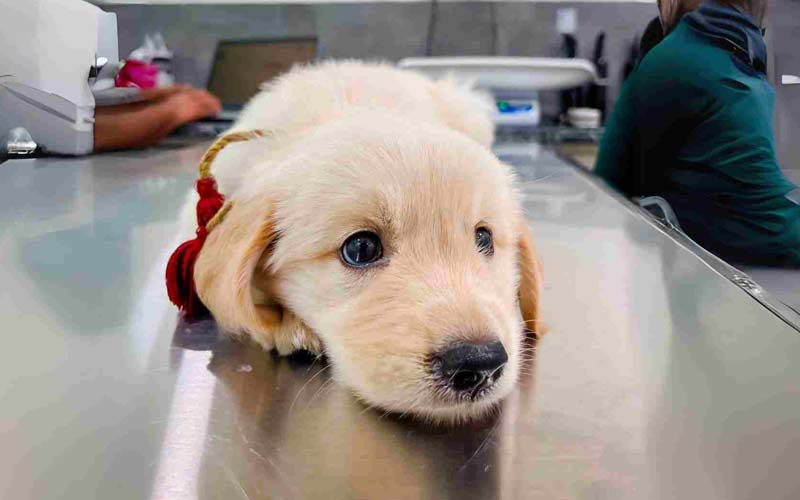Bringing a new puppy into your home is exciting, but it also comes with responsibilities—one of the most important being the health of your puppy. Deworming is a critical aspect of early care that many new puppy owners may overlook. Puppies are highly susceptible to intestinal parasites like roundworms and hookworms, which can be passed from their mother or picked up from their environment. If left untreated, these worms can cause serious health issues, including malnutrition, stunted growth, and even life-threatening complications.

This guide will provide you with a clear understanding of when to start deworming your puppy, the ideal treatment schedule, and the signs to watch for that might indicate your puppy has worms. By ensuring timely deworming, you’ll be taking a vital step in safeguarding your puppy’s health and giving them the best possible start in life.
1. Why Deworming is Essential for Puppies
Puppies are particularly vulnerable to worm infestations, and early deworming is crucial for their health and development. Several types of parasites, including roundworms and hookworms, commonly infect young puppies. These parasites can cause significant harm if not treated promptly.
How Puppies Contract Worms
Puppies can become infected with worms even before they are born. Many are exposed to roundworms through their mother’s placenta while still in utero. After birth, worms can also be transmitted through their mother’s milk. Once puppies start exploring their environment, they are further exposed to worm eggs and larvae in contaminated soil, feces, or water. Fleas, which are common carriers of tapeworms, can also lead to infection when ingested during grooming.
Health Risks Associated with Worms
Worm infestations in puppies can lead to a variety of health problems, many of which can be serious. Common risks include:
- Malnutrition: Worms feed on the puppy’s nutrients, depriving them of essential vitamins and minerals needed for growth. This can result in weight loss or failure to gain weight appropriately.
- Stunted Growth: A lack of proper nutrition, caused by worms, can hinder the puppy’s development, leading to poor growth and weaker immune systems.
- Intestinal Blockages: In severe cases, large numbers of worms can cause blockages in the intestines, which may require surgical intervention and pose life-threatening risks.
- Anemia: Certain worms, like hookworms, attach to the intestinal lining and feed on the puppy’s blood, potentially causing anemia, which can lead to weakness, fatigue, and in extreme cases, death.
By understanding the risks and acting early, you can prevent these parasites from negatively affecting your puppy’s health, ensuring they grow strong and healthy. Regular deworming is an essential part of that care.

2. When to Start Deworming a Puppy
Initial Deworming
Deworming should begin early in a puppy’s life, typically at 2 to 3 weeks old. This early intervention is critical because puppies are often born with worms, having contracted them either in utero or through their mother’s milk. At this young age, their immune systems are still developing, leaving them especially vulnerable to the harmful effects of parasitic infestations.
Worms, such as roundworms and hookworms, can quickly multiply and cause significant health issues if left untreated. Early deworming helps eliminate these parasites before they have a chance to cause severe harm, such as malnutrition, weight loss, and stunted growth. By addressing the problem early, you prevent the worms from reaching stages where they can inflict lasting damage on your puppy’s health.
Follow-Up Treatments
After the initial deworming, follow-up treatments are necessary to ensure that all stages of the worms are eradicated. It is recommended to deworm puppies every two weeks until they reach 12 weeks old. This frequent deworming schedule is essential because many worm eggs and larvae can remain dormant, only becoming active after initial treatments. By deworming regularly, you target both existing worms and any new parasites that may have hatched since the last treatment.
This consistent approach not only clears out active infestations but also prevents reinfestation, keeping your puppy safe during their most vulnerable months.

3. Ongoing Deworming Schedule for Growing Puppies
From 12 Weeks to 6 Months
Once your puppy reaches 12 weeks old, the frequency of deworming should shift to a monthly schedule. During this period, puppies are still growing rapidly and are highly susceptible to reinfestation from worms due to their ongoing exploration of the environment. Monthly deworming helps maintain a consistent level of protection, ensuring that any newly contracted parasites are promptly eliminated.
Continued protection during the growth phase is crucial. As your puppy matures, their immune system strengthens, but they are still vulnerable to the harmful effects of parasitic infections, including malnutrition, diarrhea, and developmental delays. Sticking to a monthly deworming regimen ensures that worms do not interfere with your puppy’s healthy development.
After 6 Months
Once a puppy reaches six months of age, you can begin transitioning to a less frequent deworming schedule, typically every 3 to 6 months, depending on your vet’s advice and the level of risk in your area. By this age, a puppy’s immune system is much more robust, reducing their vulnerability to severe infestations.
However, regular deworming remains vital throughout your dog’s life to prevent potential health issues, especially in environments where worms are prevalent. Long-term benefits of regular deworming include reduced risk of gastrointestinal issues, better nutrient absorption, and overall improved quality of life for your dog. Consistent deworming helps ensure that parasites never have the chance to take hold, supporting your pet’s long-term health and well-being.

4. Signs Your Puppy May Have Worms
Recognizing the signs of a worm infestation in your puppy is crucial for timely treatment. Worms can cause a range of health issues, and the sooner you act, the better the outcome for your puppy. Below are some of the most common symptoms to watch for:
- Visible Worms in the Stool: One of the clearest signs of a worm infestation is seeing worms in your puppy’s stool or vomit. Roundworms, which resemble spaghetti, are often visible, while tapeworm segments may appear as small, rice-like particles around your puppy’s rear or in their bedding.
- Diarrhea and Vomiting: Worms can irritate your puppy’s gastrointestinal tract, leading to frequent diarrhea or vomiting. In severe cases, blood may be present in the stool, signaling a more advanced infection.
- Bloated Belly: A swollen or bloated abdomen is a classic sign of worm infestation, particularly in young puppies. This occurs because the worms are taking up space in the digestive system, leading to an uncomfortable distended appearance.
- Lethargy and Weight Loss: Worms deprive your puppy of essential nutrients, which can result in noticeable weight loss and a lack of energy. If your puppy is eating normally but still losing weight or appears unusually tired, worms may be the cause.
Observing these signs early is critical, as worms can quickly weaken your puppy and cause long-term health complications. If you notice any of these symptoms, it’s important to act quickly by consulting your vet and administering the appropriate deworming treatment. Prompt action will help prevent further harm and ensure your puppy stays on track for healthy growth.

5. Types of Worms and Deworming Medications
Common Types of Worms Affecting Puppies
Puppies can be affected by several types of intestinal worms, each requiring different treatments:
- Roundworms: These are the most common type of worms found in puppies. They resemble spaghetti and can be seen in the stool or vomit. Roundworms can cause symptoms like abdominal swelling, diarrhea, and vomiting.
- Hookworms: These worms are smaller and attach to the intestinal lining, feeding on blood. They can lead to anemia, weight loss, and general weakness. Hookworms are particularly dangerous because they can cause serious health problems if not treated promptly.
- Tapeworms: Tapeworms are flat, segmented worms that can often be seen in the stool or around the puppy’s anus. They are transmitted through fleas and can cause weight loss and itching around the rear end.
- Whipworms: These worms are less common but can still affect puppies. They reside in the large intestine and cause symptoms such as diarrhea, weight loss, and dehydration.
Overview of Common Deworming Medications
Deworming medications are crucial for managing and eliminating these parasites. They come in two main forms:
- Prescription Treatments: These are usually recommended by veterinarians and are tailored to target specific types of worms. Prescription dewormers are often more effective and are necessary for severe infestations or when dealing with resistant strains of worms.
- Over-the-Counter Treatments: These are available without a prescription and can be effective for common worm types. However, they may not address all types of worms or severe infestations. It’s essential to choose an over-the-counter product that is appropriate for your puppy’s age and weight.
Importance of Using the Right Medication
Using the correct deworming medication is crucial for effective treatment. Different worms require different medications, and using the wrong type can be ineffective or even harmful. Proper diagnosis by a veterinarian will determine the specific worm infestation and the most appropriate treatment.
Consulting a Vet for Diagnosis and Treatment
It is always best to consult a vet for an accurate diagnosis and treatment plan. A vet can perform stool tests to identify the type of worms present and recommend the most effective deworming medication. They can also provide guidance on the appropriate dosage and schedule for treatment, ensuring that your puppy receives the best care possible.

6. How to Administer Deworming Treatment
Step-by-Step Guide on How to Give Deworming Medication to Your Puppy
Administering deworming treatment correctly is vital for ensuring that your puppy receives the full benefit of the medication. Here’s a step-by-step guide to help you through the process:
Read the Instructions: Before administering any medication, carefully read the instructions provided by your vet or the medication packaging. This ensures you understand the correct dosage and method of administration.
Prepare the Medication:
- Oral Tablets: If using tablets, place the tablet in your hand and use your thumb and forefinger to gently open your puppy’s mouth. Place the tablet as far back on the tongue as possible, then quickly close the mouth and gently hold it closed. Rub the puppy’s throat to encourage swallowing.
- Liquid Doses: Shake the bottle if required and use the provided dropper or syringe to measure the correct dose. Gently lift your puppy’s head and insert the syringe into the side of the mouth, aiming for the back of the throat. Administer the liquid slowly and gently.
- Chewables: These can often be mixed with your puppy’s food. Break the chewable into smaller pieces if necessary and mix it with a small amount of food that your puppy likes. Ensure your puppy eats the entire portion to get the full dose.
- Monitor Your Puppy: After administering the medication, observe your puppy for any adverse reactions. Common side effects are usually mild, such as temporary gastrointestinal upset. If you notice anything concerning, contact your vet.
- Clean Up: Wash your hands thoroughly after handling any medications to avoid any contamination.
Tips for Making the Process Easier
- Create a Routine: Administer the medication at the same time each day to create a routine, making it easier for both you and your puppy.
- Use Treats: If your puppy is hesitant, you can hide the medication in a small treat or a bit of peanut butter to mask the taste. This can help in making the process less stressful.
- Be Calm and Patient: Approach the task calmly and gently to reduce your puppy’s anxiety. A positive attitude will help make the experience smoother.
Importance of Following Up with Additional Doses
Following the prescribed schedule is crucial for effectively eliminating worms. Some deworming treatments require multiple doses to ensure all stages of the parasites are eradicated. Missing doses or not completing the full treatment course can result in incomplete eradication and potential reinfestation.
Ensure you follow up with any additional doses as prescribed by your vet. Keeping track of your puppy’s deworming schedule and adhering to it will provide the best protection against parasitic infections, promoting a healthier and happier life for your puppy.

7. Preventing Worm Reinfestation
Preventing worm reinfestation is crucial for maintaining your puppy’s health and ensuring that they remain free from parasites. Implementing effective hygiene practices and environmental controls will help minimize the risk of worms and keep your puppy healthy. Here’s how you can achieve this:
Best Practices for Keeping Your Puppy’s Environment Clean
Regularly Clean Bedding, Toys, and Food Bowls:
- Bedding: Wash your puppy’s bedding regularly in hot water to kill any potential worm eggs or larvae. A clean sleeping area reduces the risk of exposure to parasites.
- Toys: Clean toys frequently with pet-safe disinfectants to prevent contamination. Puppies often chew on toys, making them a potential source of infection if not kept clean.
- Food Bowls: Wash food and water bowls daily with hot, soapy water to prevent the buildup of harmful bacteria and parasites.
Pick Up Waste Immediately During Walks and in the Yard:
- During Walks: Always carry waste bags and promptly pick up after your puppy during walks. This helps prevent the spread of worm eggs and larvae in public areas.
- In Your Yard: Regularly clean up feces from your yard to reduce the risk of contamination. Worm eggs can survive in soil for extended periods, posing a risk of reinfestation.
Recommendations for Flea Control
Fleas can transmit tapeworms, so controlling fleas is an essential part of preventing worm infestations. Use a vet-recommended flea control product to manage and prevent flea infestations. Regularly check your puppy for fleas and consult your vet about appropriate flea prevention and treatment options.
Preventing Exposure to High-Risk Environments
Avoid exposing your puppy to areas where the risk of worm infections is high:
- Contaminated Soil: Prevent your puppy from digging or playing in areas where soil may be contaminated with worm eggs, such as areas frequented by other animals.
- Feces: Keep your puppy away from other animals’ feces and contaminated environments, which can be sources of worm eggs.
By maintaining a clean environment, practicing effective flea control, and preventing exposure to high-risk areas, you can significantly reduce the likelihood of worm reinfestation. These proactive measures will help ensure that your puppy remains healthy and free from parasites throughout their life.

8. Consulting Your Veterinarian
The Importance of a Vet’s Role in a Puppy’s Deworming Schedule
Your veterinarian plays a crucial role in managing your puppy’s deworming schedule. They provide expert guidance tailored to your puppy’s specific needs, including the appropriate types of dewormers, dosage, and timing. A vet can accurately diagnose worm infestations through stool tests and recommend the most effective treatment plan, ensuring that all potential parasites are addressed. Their expertise helps avoid the risks associated with improper deworming and ensures your puppy receives the best care possible.
When to Contact the Vet
It is essential to consult your vet if you notice any symptoms of worm infestations after deworming, such as persistent diarrhea, vomiting, or a bloated belly. These symptoms may indicate that the initial treatment was not entirely effective or that a different type of worm is present. Additionally, if your puppy shows signs of distress or adverse reactions to the medication, contacting your vet promptly is crucial for adjusting the treatment plan or providing additional care.
Risks of Over-the-Counter Dewormers
While over-the-counter dewormers can be convenient and are sometimes effective, they come with potential risks. These products may not cover all types of worms or may be less effective against certain strains. Incorrect use or choosing the wrong type of medication can lead to inadequate treatment or harmful side effects. Professional veterinary guidance ensures that the correct medication is chosen based on a thorough diagnosis, minimizing risks and enhancing the effectiveness of the treatment.
By maintaining regular consultations with your vet and seeking their advice when needed, you ensure that your puppy receives comprehensive and safe deworming care. Their professional oversight is vital for addressing any issues that arise and for adapting the treatment plan to meet your puppy’s evolving needs.

Conclusion
Deworming is a fundamental aspect of ensuring your puppy’s health and well-being. From the initial deworming at 2 to 3 weeks old to the ongoing treatments during their growth phase, timely and effective deworming prevents the harmful effects of parasitic infestations and supports your puppy’s healthy development. Recognizing the signs of worms, understanding the types of parasites, and knowing how to administer treatments are all critical for effective care.
Preventing reinfestation through proper hygiene, flea control, and avoiding high-risk environments is essential for maintaining your puppy’s health. Consulting with your veterinarian ensures that you receive expert guidance tailored to your puppy’s specific needs, minimizing risks and enhancing treatment efficacy.
Take action now by setting up a deworming schedule for your puppy, following through with all recommended treatments, and maintaining a clean environment to keep parasites at bay. Regular veterinary check-ups will help monitor your puppy’s health and adjust treatments as needed.
By staying proactive and informed, you provide your puppy with the best start in life, free from the dangers of worms and full of vitality.